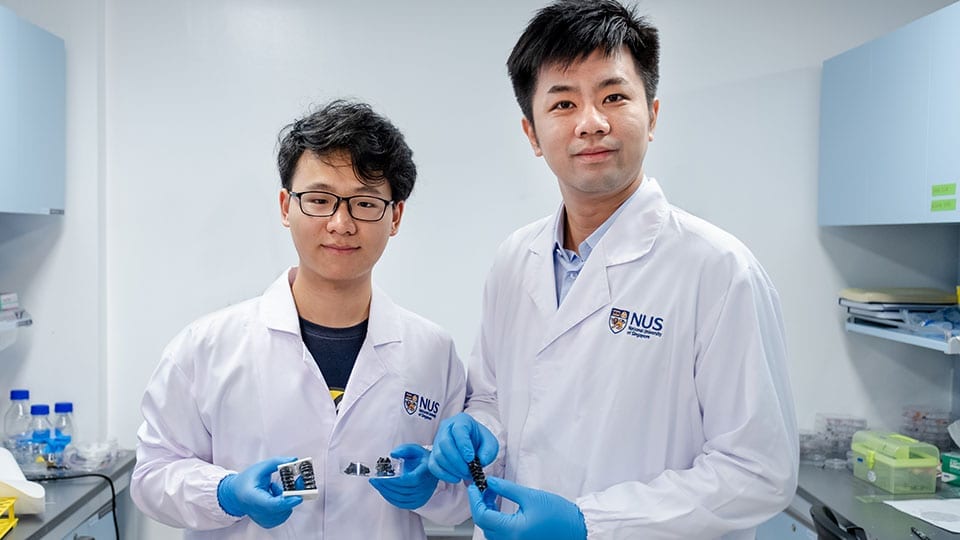
via Lancaster University
Researchers at Lancaster University are using X-rays to help farmers increase yields and cut water pollution following an unexpected discovery in a pea and bean crop.
Plant and Soil Scientists hope to combine two new technologies to provide a rapid “same day” measurement of soil phosphorus availability, enabling farmers and growers to make more informed decisions about fertiliser application.
The move to develop this technique came about following an unexpected discovery by Dr Shane Rothwell, as part of his PhD studies at Lancaster University.
Dr Rothwell noticed that, contrary to expectations, pea and bean crop yields were sometimes decreased by up to 30 per cent when they were treated with recommended levels of lime – despite the fact that application of lime is expected to to improve the availability of plant nutrients.
He demonstrated that the reduced crop growth was associated with lower plant phosphorus content but existing ways of measuring the phosphorus in soil available for plant uptake were not picking up on the problem.
Consequently, developing a test to more accurately predict soil phosphorus availability following liming would benefit farmers and the environment, preventing waste and pollution.
Read more: Smart farming technique to boost yields and cut fertiliser pollution
The Latest on: Fertiliser pollution
[google_news title=”” keyword=”Fertiliser pollution” num_posts=”10″ blurb_length=”0″ show_thumb=”left”]
via Google News
The Latest on: Fertiliser pollution
- Layers Of Responsibility For Dutch Nitrogen Pollutionon April 27, 2024 at 10:49 am
For years, Dutch farmers have been encouraged to go big. This has led to an environmental crisis where “manure is coming almost out of the barns.” ...
- New chicken megafarms ‘should be blocked’ due to toxic air pollutionon April 27, 2024 at 5:00 am
Campaigners call for planning restrictions on factory farms after i investigation reveals major health concerns ...
- Minnesota’s actions foreshadow potential farm regulations for Iowaon April 26, 2024 at 2:07 pm
Environmental groups recently asked the federal government to intervene in northeast Iowa, where ag pollution is believed to have contaminated scads of private wells with unhealthy concentrations of ...
- Utah may join lawsuit against EPA coal plant rules with the help of new legislationon April 26, 2024 at 12:18 pm
After the Environmental Protection Agency released stricter standards for existing coal power plants and new gas facilities’ carbon pollution, their wastewater, coal ash residuals, and mercury and air ...
- Work to tackle pollution in Ireland's largest lake could be ‘paused’ due to budget shortfallon April 26, 2024 at 10:57 am
Work to tackle pollution problems at Lough Neagh may have to be paused due to a budget shortfall, a Stormont minister has warned.
- Iowa Fertilizer Spill Threatens Mississippi Riveron April 25, 2024 at 9:51 am
Latest spill comes amidst mounting calls for state and federal action on Iowa’s agricultural water pollution crisis, linked to high cancer rates ...
- Wisconsin abandoned rules on nitrates pollution. Now, solutions seem far offon April 25, 2024 at 4:01 am
After formal rulemaking to address nitrate contamination failed nearly three years ago, there is still no consensus on how to fix the issue.
- Kalbach: Immediate action needed on corporate ag pollutionon April 23, 2024 at 9:51 am
Iowa agriculture has undergone substantial changes over the past 40 years. We see it all around us. Rather than crops and livestock being raised on tens of ...
- With broad support for Minnesota fertilizer fees, House Democrats want to shift fund's focuson April 19, 2024 at 7:38 am
Minnesota House DFL members seek to continue to charge the 40-cent fee on fertilizer sold. However the fee would instead go specifically to improve southeast Minnesota water quality.
- EU rules seen as insufficient to fix nutrient pollutionon April 18, 2024 at 3:21 am
From rivers and lakes to lagoons and seas, numerous aquatic environments across Europe are grappling with a silent yet ubiquitous threat – an excess of nutrients that disrupt their ecological balance ...
via Bing News










